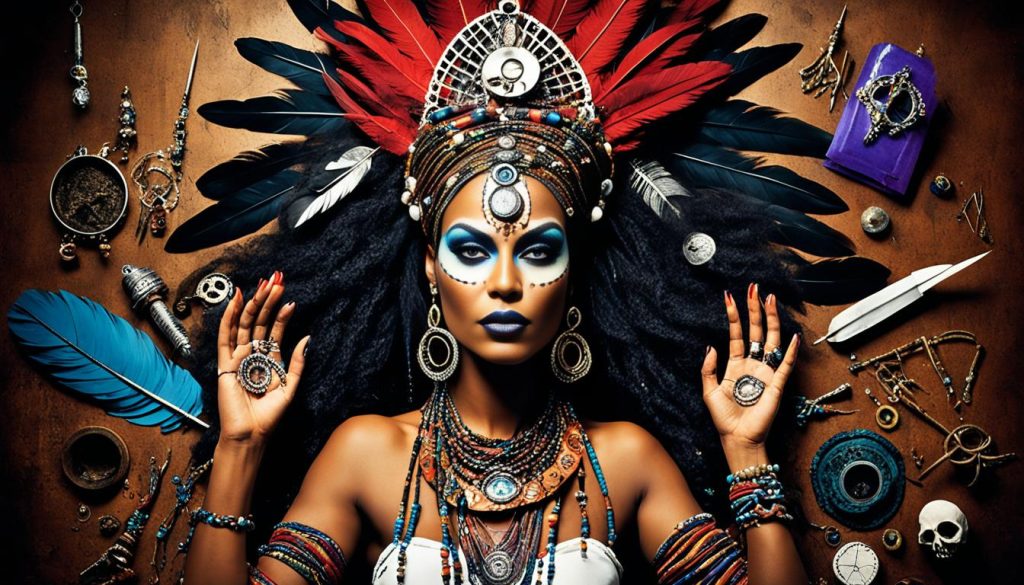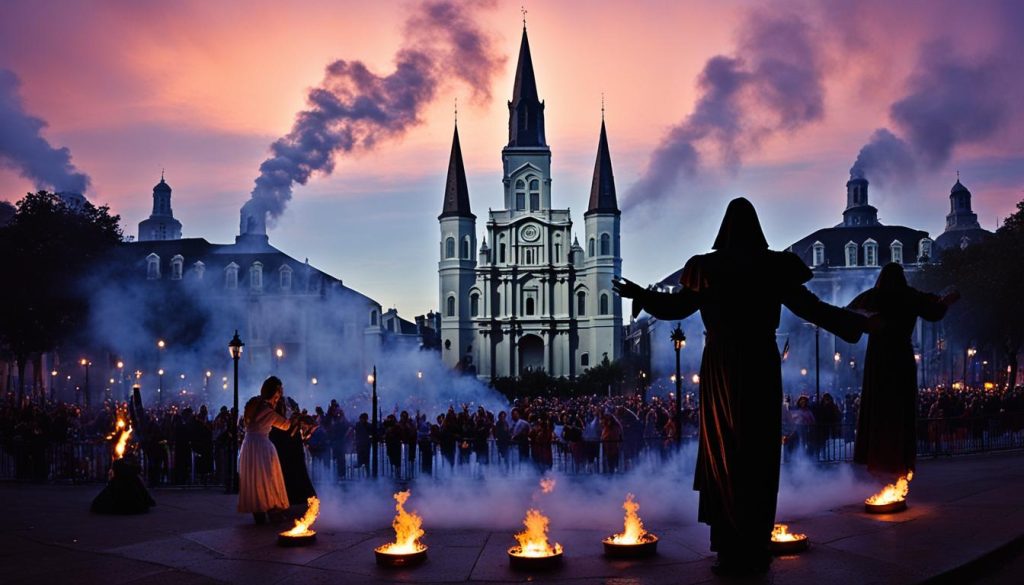Discover the enchanting world of New Orleans voodoo and immerse yourself in its captivating history. New Orleans, known for its vibrant culture and rich traditions, has long been intertwined with the mystical practices of voodoo. This unique blend of West African religions and Catholicism has shaped the fabric of the city, creating a compelling tapestry of rituals, beliefs, and famous personalities.
Step into the mesmerizing world of voodoo in New Orleans, where history and mysticism converge. From its origins rooted in West Africa to its manifestations in the vibrant streets of the French Quarter, this ancient religion leaves visitors spellbound with its intriguing traditions.
Delve into the fascinating history of New Orleans voodoo and discover how it emerged during the time of French and Spanish rule. Witness the convergence of cultures as enslaved Africans merged their traditional religious practices with Catholicism, giving birth to a distinctive form of voodoo that still thrives today.
Unravel the stories of iconic figures like Marie Laveau, the voodoo queen who wielded immense influence and power in the city. Learn about the rituals, symbols, and practices that have been passed down through generations, and explore the authentic voodoo ceremonies held in Congo Square, a historic gathering place for enslaved Africans.
Immerse yourself in the vibrant voodoo community of New Orleans, where practitioners continue to honor their ancestors and connect with the spiritual realm. Experience the magic and energy that permeate the city as you witness voodoo rituals, partake in traditional celebrations, and explore landmarks dedicated to the practice of voodoo.
Uncover the mystique and allure of New Orleans voodoo as you journey through its captivating history and vibrant traditions. Come with an open mind and leave with a newfound appreciation for the rich cultural heritage that makes this city truly unique.
The Origins of Voodoo in New Orleans
Voodoo in New Orleans has its origins in the religious practices of enslaved West Africans who merged their traditions with Catholicism. During the time of French and Spanish rule, the religion made its way to the city, brought by Haitian refugees escaping the slave revolt in Haiti.
Known as Voodoo-Catholicism, the practice in New Orleans is deeply connected to nature, spirits, and ancestors. It encompasses a range of rituals, including dance, music, chanting, and the use of snakes as mediators with the spirits.
During the 1800s, voodoo became an integral part of the culture of free people of color in New Orleans. Voodoo queens and kings, like Marie Laveau, held not only spiritual but also political power, influencing the community with their beliefs and practices.
Famous Personalities in New Orleans Voodoo
When it comes to New Orleans voodoo, there are two names that stand out as iconic figures in its history: Marie Laveau and Dr. John.
Marie Laveau, often referred to as the “Voodoo Queen of New Orleans,” was a powerful practitioner of voodoo and a devout Catholic. Her mystical skills and healing abilities made her a revered figure in the city. Marie Laveau lived in the vibrant French Quarter, where she conducted her spiritual practices and provided guidance to those seeking her help.

Another prominent personality in New Orleans voodoo is Dr. John, also known as Bayou John. He was a voodoo king and healer who played a significant role in the voodoo community. Driven by his strong belief in the power of voodoo, Dr. John dedicated his life to helping others through spiritual and medicinal means.
These influential figures, Marie Laveau and Dr. John represent the rich heritage and tradition of voodoo in New Orleans. Their contributions to the practice of voodoo have left an indelible mark on the city, solidifying its reputation as a hub for voodoo practitioners and enthusiasts.
Voodoo Practices and Celebrations in New Orleans
Voodoo rituals and practices are still very much alive in the vibrant city of New Orleans. One significant gathering place for voodoo ceremonies during the time of slavery was Congo Square, situated in the heart of Armstrong Park. This historic location continues to honor the traditions of voodoo and serves as a thriving hub for cultural meetings and festive celebrations.
For those eager to delve deeper into the captivating world of voodoo, the city offers two popular attractions—the Voodoo Spiritual Temple and the New Orleans Historic Voodoo Museum. These unique establishments provide visitors with an immersive experience, allowing them to explore the rich history and intricate practices of voodoo. From artifacts and sacred objects to insightful exhibits and knowledgeable guides, these venues offer valuable insights into the realm of voodoo rituals and beliefs.
One of the most anticipated voodoo celebrations in New Orleans is St. John’s Eve, a vibrant and spiritually charged event held annually on June 23rd. This lively celebration combines traditional voodoo rituals and joyful parties, bringing together locals and visitors alike in a shared experience of cultural appreciation and community connection.
Immerse yourself in the world of voodoo and discover the captivating rituals, vibrant celebrations, and intriguing history that make New Orleans a hub for voodoo culture. The lure of voodoo rituals and celebrations continues to captivate visitors, with the Voodoo Spiritual Temple, the New Orleans Historic Voodoo Museum, and the energetic St. John’s Eve celebration serving as gateways into this mystical world.

Conclusion
Voodoo is an integral part of New Orleans’ cultural identity and history. This unique blend of West African religions and Catholicism found its way to the city through enslaved Africans and Haitian refugees, leaving a lasting impact on its traditions and practices.
Famous voodoo queens and kings, like Marie Laveau and Dr. John, played significant roles in popularizing voodoo in New Orleans. Their spiritual abilities and influence on the voodoo community helped solidify its place in the city’s cultural tapestry.
Today, voodoo practices and celebrations are still observed, drawing visitors who seek to delve into its mystique and rich cultural heritage. Landmarks and attractions dedicated to voodoo, such as the Voodoo Spiritual Temple and the New Orleans Historic Voodoo Museum, offer insights into the history and rituals of this fascinating religion.
New Orleans voodoo continues to captivate visitors with its enchanting blend of spirituality and cultural significance. It serves as a reminder of the diverse influences that have shaped the city, making it an intriguing destination for those who want to explore its voodoo roots and immerse themselves in its vibrant atmosphere.